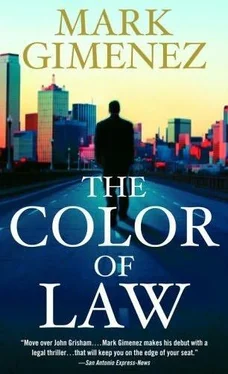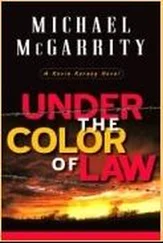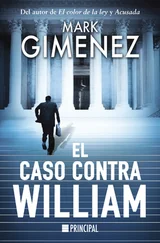Mark Gimenez - The Color of Law
Здесь есть возможность читать онлайн «Mark Gimenez - The Color of Law» весь текст электронной книги совершенно бесплатно (целиком полную версию без сокращений). В некоторых случаях можно слушать аудио, скачать через торрент в формате fb2 и присутствует краткое содержание. Жанр: Криминальный детектив, на английском языке. Описание произведения, (предисловие) а так же отзывы посетителей доступны на портале библиотеки ЛибКат.
- Название:The Color of Law
- Автор:
- Жанр:
- Год:неизвестен
- ISBN:нет данных
- Рейтинг книги:3 / 5. Голосов: 1
-
Избранное:Добавить в избранное
- Отзывы:
-
Ваша оценка:
- 60
- 1
- 2
- 3
- 4
- 5
The Color of Law: краткое содержание, описание и аннотация
Предлагаем к чтению аннотацию, описание, краткое содержание или предисловие (зависит от того, что написал сам автор книги «The Color of Law»). Если вы не нашли необходимую информацию о книге — напишите в комментариях, мы постараемся отыскать её.
The Color of Law — читать онлайн бесплатно полную книгу (весь текст) целиком
Ниже представлен текст книги, разбитый по страницам. Система сохранения места последней прочитанной страницы, позволяет с удобством читать онлайн бесплатно книгу «The Color of Law», без необходимости каждый раз заново искать на чём Вы остановились. Поставьте закладку, и сможете в любой момент перейти на страницу, на которой закончили чтение.
Интервал:
Закладка:
“Well, Mr. Fenney, me and the Feds, we got some, uh, outstanding issues, if you know what I mean.”
Scott knew what Louis meant. He noticed the peephole in the door turn dark. And he heard a tiny voice: “That the lawyer?”
“Yeah,” Louis said.
The peephole went light again and Scott heard the sound of a heavy object being pushed away from the door, then the releasing of five deadbolts. The door opened a crack and a small brown face with big brown eyes gazed up at Scott.
“You gonna save my mama?” she asked.
“Pajamae. That’s a, uh, different sort of name.”
Her face glued to the Ferrari’s air-conditioning vent, the little black girl said, “Mama says it’s French, but it’s really just black. We don’t do names like Susie and Patty and Mandy down here. We do names like Shantay and Beyonce and Pajamae.”
“My daughter’s name is Boo.”
She smiled. “That’s different.”
Scott smiled back. “She’s different. You’d like her.”
Scott had relaxed considerably once they had left the projects and turned onto Martin Luther King Boulevard, the main thoroughfare through South Dallas. His heartbeat was near normal and his body wasn’t sweating like a sprinkler hose. He wasn’t even slouched in his seat. He was sitting upright, looking around at this strange environment like a Japanese tourist at a rodeo. On one side of the street was the tall black wrought-iron fence that guarded the Fair Park grounds; inside were the Cotton Bowl stadium where the Cowboys had played until they struck out for the suburbs, and the historic Art Deco buildings dating back to the Texas Centennial Exposition of 1936 that now sat abandoned and decaying like an old movie set. On the other side of the street were overgrown vacant lots that apparently served as the neighborhood’s unofficial dumps, and boarded-up structures with broken-out windows and black men loitering outside.
“Crack houses,” Pajamae said.
Run-down strip centers offered pawn shops and liquor stores. Ramshackle frame houses slanted at twenty-degree angles, their paint peeling like skin from a badly sunburned body. Sofas sat on droopy porches, old cars were jacked up on cement blocks in the yards, garbage was backed up at the streets, and black burglar bars guarded every door and window of every house and storefront as if each structure were its owner’s personal prison. The entire landscape was dull and colorless, except for the graffiti adorning every wall and fence and the thick-bodied black women strolling by in colorful skirts and shorts and heels.
“Working girls,” Pajamae said. “Mama says they work down here because they’re too fat to get white tricks on Harry Hines.”
Scott was imagining living in this neighborhood, walking these streets with Boo, or worse, Boo walking alone, when his peripheral vision caught a commotion at the side of the road, and he slowed…a little.
“What’s going on?”
On the sidewalk outside a dilapidated apartment complex was a massive pile of belongings, everything from a microwave to clothes, a basketball to dolls, as if someone had backed up a truck and dumped the stuff there. Sitting on the curb were two black kids, their elbows on their knees, their chins cradled in their palms, looking like their world had just come to an end. An obese black woman in red stretch shorts and a white T-shirt was yelling and gesturing wildly at a skinny black man wearing a short-sleeve shirt and a tie. Pajamae strained her neck to see, then slumped back down.
“Eviction day,” she said matter-of-factly.
“They got evicted from their apartment?”
“Yeah. Happens first of every month.”
As a young lawyer, Scott had appeared in J.P. court numerous times on behalf of landlords to evict deadbeat tenants. But he had never witnessed firsthand the law in action-a family’s personal property removed from their apartment and dumped on the sidewalk out front, exactly as the eviction statute mandated. He glanced back at the scene and then accelerated away. When the Ferrari’s expensive racing tires hit the interstate heading north to downtown Dallas, he breathed a sigh of relief.
“My daddy, he was white,” Pajamae said.
He glanced over at the girl in the passenger’s seat. She was a cute kid with facial features that were more white than black. Her hair was done in neat rows braided lengthwise and snug to her scalp with long braids hanging to her narrow shoulders; she was wearing a pink T-shirt, jean shorts, pink socks folded down, and white Nike sneakers. Other than her light brown skin, she was no different from all the little girls Scott had seen in Highland Park-except for the cornrows.
“Where is he?”
“Dead.”
“Oh. I’m sorry.”
“I’m not. He hurt my mama.”
“How did he die?”
“Po-lice shot him. He was dealing.”
She ran her finger lightly over the dash, as if checking for dust, and then she turned to Scott.
“Mr. Fenney, did my mama kill that white man?”
“No, baby, I ain’t killed no one,” Shawanda said through the glass partition, her right palm plastered to her side of the window and matched by Pajamae’s left palm on the other side. Both mother and daughter were crying and aching to hold each other. When Shawanda had said she had a child, Scott had naturally assumed she was a lousy mother-she was a prostitute, for God’s sake. But seeing them together now, it occurred to him that this woman loved her daughter as much as he loved his. He turned to the black guard.
“Can’t they be together?”
The guard’s eyes dropped; he scratched his chin. When his eyes came back up, he said, “You here to discuss her defense?”
Scott caught on quickly. “Yes.”
The guard gestured at Pajamae. “She a material witness?”
“Yes.”
“Okay.”
The guard led them to the small room where Scott and Shawanda always met. He patted Scott down, but he only patted the top of Pajamae’s head. When he brought Shawanda in, she dropped to her knees and embraced Pajamae for the longest time. The guard said he’d wait outside. Shawanda finally released Pajamae, then cupped her daughter’s face and just stared at her, as if examining every inch of her smooth face. Then she held Pajamae at arm’s length and looked her up and down.
“You dress yourself real nice,” Shawanda said. “Louis bringing you groceries, watching out for you?”
Pajamae nodded. “Yes, Mama.”
“You staying inside?”
Another nod. “Yes, Mama.”
Shawanda appeared in much better health than the last time Scott had seen her, more alert, making Scott less worried she might puke on his suit.
“You sleeping now?” Scott asked.
“Yes, sir, Mr. Fenney. I’m over the worst part, except the headaches.”
“I brought your medicine, Mama,” Pajamae said.
“Good girl.”
“I always take Tylenol for headaches,” Scott said.
“I need something stronger.”
“Ibuprofen?”
“Yeah, Ibu…that.”
“When are you getting out, Mama?”
“I ain’t, not till after the trial. If Mr. Fenney here prove me innocent.”
Scott said, “No, Shawanda, I don’t have to prove you’re innocent. The government’s got to prove you’re guilty.”
Shawanda looked at him like an adult at a naive child.
“Mr. Fenney, you got a lot to learn.”
“When’s the trial?” Pajamae asked.
“End of August,” Scott said.
Pajamae made a face. “But that’s two months from now! What am I supposed to do for that long? Mama, I’m scared to be alone in the projects!”
And the fear Scott Fenney had experienced less than an hour earlier returned with a vengeance. Sweat broke out on his forehead again. His heart beat faster again. His mind played out his odds of survival again, a fat little rabbit chased by a pack of wolves. He did not want to go back into South Dallas, not today, not ever. He did not want to take this little black girl back to her apartment in the projects and get out of the Ferrari and walk her to the door through a gauntlet of strong young black males looking upon him as prey. What if Louis weren’t there to chaperone? But he couldn’t very well put a little girl on a public bus or in a taxi alone. What the hell could he do with her? While mother and daughter embraced and shared tears, Scott’s agile mind worked through all the available options until it arrived at an answer: Consuela de la Rosa.
Читать дальшеИнтервал:
Закладка:
Похожие книги на «The Color of Law»
Представляем Вашему вниманию похожие книги на «The Color of Law» списком для выбора. Мы отобрали схожую по названию и смыслу литературу в надежде предоставить читателям больше вариантов отыскать новые, интересные, ещё непрочитанные произведения.
Обсуждение, отзывы о книге «The Color of Law» и просто собственные мнения читателей. Оставьте ваши комментарии, напишите, что Вы думаете о произведении, его смысле или главных героях. Укажите что конкретно понравилось, а что нет, и почему Вы так считаете.












